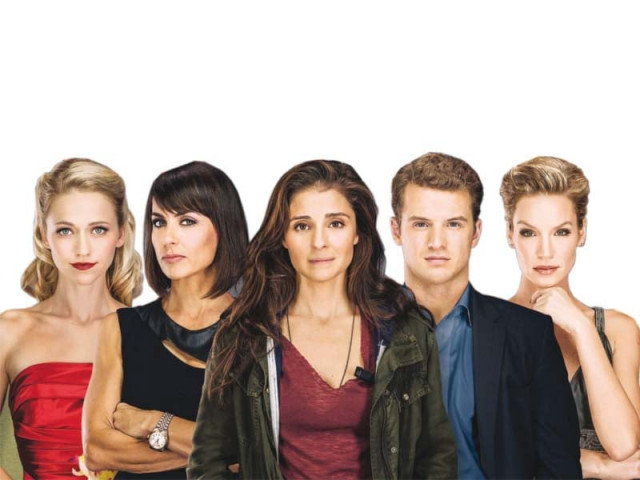TV show: UnReal: The F-word
Producer Sarah Gertrude Shapiro’s television show UnReal takes on feminism.

Producer Sarah Gertrude Shapiro’s television show UnReal takes on feminism.
In pop culture, feminism has been undergoing a rebranding for some time now: in 2011, Beyonce commented, “I need to find a catchy new word for feminism, right? Like ‘bootylicious’.” Three years later, the F-word towered above her in white hot lights at the MTV Video Music Awards as she performed Flawless (which began with a recording of Nigerian Chimamanda Ngozi Adichie’s feminist manifesto). “I’ve always considered myself a feminist, although I was always afraid of that word because people put so much on it,” Bey explained in another interview. In June, Kim Kardashian was the latest celebrity to endorse — well, sort of — the movement, explaining, “I’ve never really been one on labels, and I don’t like to push my view… But yeah, I think you would call me a feminist.”
The long-winded, lukewarm affirmations always cast an eye towards those who, when hearing the word ‘feminist’, imagine a horde of bra-burning, man-hating, hairy-armed angry ladies. It wasn’t too long ago (2009) that Lady Gaga corrected an interviewer, saying, ‘I’m not a feminist — I love men.” So when a new television show hinted at an exploration of modern-day feminism, I wondered what the latest re-branding entailed.
UnReal is based on the experiences of Sarah Gertrude Shapiro, a producer on the reality TV show The Bachelor for nine seasons. A tell-all, the show is a brutal behind-the-scenes look at how reality shows are scripted and their participants manipulated into giving us an hour of drama that will leave us rubbernecking. Shapiro definitely has an agenda — she was only released from her contract as producer when she threatened to kill herself if she had to keep working on The Bachelor — and the first few episodes leave you feeling queasy. You’ve now seen how the sausage gets made. You think of years spent gleefully, spitefully consuming the stories of Bridezillas and Honey Boo Boo.
The show literally wears the feminist label: when we meet the main character Rachel (Shiri Appleby), she’s wearing a grubby t-shirt that says, ‘This is what a feminist looks like’. She’s a women’s studies major who earns her living manipulating a group of women competing for a marriage proposal from a rich Englishman, scratching ever so gently, persistently, at the surfaces of their deepest insecurities and fears in a way that will make them act like the catty, scheming women we love to watch. One character’s pills to control her bi-polar personality are switched for sugar tablets, another is coaxed to come out on national television and someone else’s daddy issues are mined to keep her competing to ‘win’ the bachelor.
Even as this is a show-within-a-show about winning a man’s affection, it passes the Bechdel test with flying colours; the women are entirely attuned to the transactional nature of the ‘love story’ they’re participating in and most of them aren’t even on the show to win the guy. Some are just in it for the resultant fame (or infamy).
The show criticises a system that encourages women to pursue a fairytale, but also lays bare how women — especially self-avowed ‘feminists’ — have to practice a degree of cognitive dissonance in order to maintain their ideals while living within this system. It would have been easy for Shapiro to create caricatures instead of nuanced characters in order to drive her point home, but to do so would have been to fall prey to the very culture that the show criticizes, one of cookie-cutter concepts of femininity. Instead, the show argues that while feminism may have one core rule — a commitment to equality — there are a myriad ways to get to its heart.

Published in The Express Tribune, Sunday Magazine, July 26th, 2015.



















COMMENTS
Comments are moderated and generally will be posted if they are on-topic and not abusive.
For more information, please see our Comments FAQ